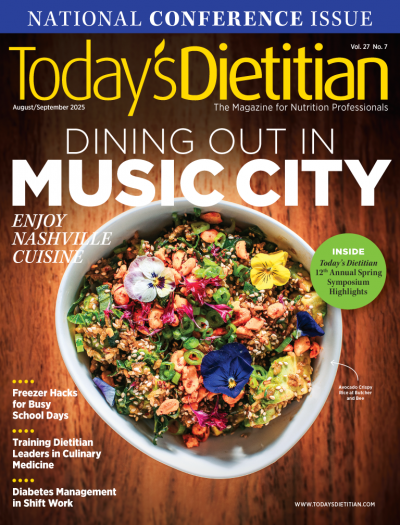Today’s Dietitian
Vol. 23, No. 7, P. 10
Q: I’ve heard that TikTok showcases some inaccurate and potentially dangerous diet trends. Could you highlight the most popular trends and explain them?
A: Most, if not all, social media outlets feature a bevy of disreputable diet information; for tweens, teens, and young adults, the biggest source arguably is TikTok, an app that features short-form video content. The app was downloaded more than 315 million times in 2020 and is the leading app on Google Play and Apple’s App Store. As of February 2021, TikTok had nearly 83 million active monthly users and is most popular among Gen Z, with roughly 25% of US users teenaged or younger.1
While what’s popular on the platform shifts frequently, this article highlights two common trends clients may encounter on TikTok and ask about, and provides recommendations on how dietetics practitioners can help clients minimize potential health and psychological harms.
Chlorophyll Water
Many popular TikTok users tout the supposed benefits of adding liquid chlorophyll drops into water. Claims include that the drops stimulate the immune system, detoxify the blood, clean the intestines, deodorize sweat glands, energize the body, and even prevent cancer.
Chlorophyll is a green pigment found in organisms that undergo photosynthesis, including all plants and some algae and microorganisms. As a supplement, liquid chlorophyll often is derived from mulberry leaf, alfalfa, and algae. Other liquid chlorophyll is made from chlorophyllin, a semisynthetic water-soluble version of chlorophyll made by combining sodium and copper salts with chlorophyll, which is supposed to be more absorbable by the body compared with naturally derived chlorophyll, which is fat soluble.
While chlorophyll does have some antioxidant properties, there’s little research supporting the health claims proliferated on TikTok. A 2009 in vitro study suggested that chlorophyllin may inhibit DNA synthesis of colon cancer cells, but researchers concluded that more studies are needed.2 A 2004 pilot study noted that consuming wheatgrass was associated with fewer needed blood transfusions in those with thalassemia, an inherited disorder that causes the blood to be low in hemoglobin. However, researchers emphasized that it’s unclear whether chlorophyll, rather than some other compound in wheatgrass, is responsible for the connection.3
According to the Natural Medicines Database, short-term clinical studies have shown safety when chlorophyll was used for as long as four weeks; however, there’s insufficient evidence to determine whether supplementation is effective to help treat any of the aforementioned health conditions. Furthermore, there’s insufficient evidence regarding the safety of chlorophyll when used orally in medicinal doses. Reported side effects of liquid chlorophyll include photosensitivity, gastrointestinal distress, and dermatitis, and it’s contraindicated during pregnancy and lactation.4
#WhatIEatInADay Videos
Thousands of videos on TikTok use the hashtag #WhatIEatInADay to showcase what wellness influencers and regular users eat in one day. During the pandemic, many individuals were excited to showcase what they were cooking, which gradually went further to include videos and posts that documented users’ and influencers’ daily consumption. Many of these videos and posts of #WhatIEatInADay promote a daily menu that’s inadequate to meet the calorie needs of most individuals. These include a popular title on TikTok, “What I eat in a day—under 1,200 calories.” The underlying message in many of these videos is, “If you eat like me, you can look like me.”
Although #WhatIEatInADay videos and posts are supposed to “inspire,” and despite the fact TikTok encourages users to report content that glorifies or promotes eating disorders for removal, these posts can contribute to disordered eating and also can trigger those with a history of eating disorders. A 2021 published case study discusses how social media platforms such as TikTok can promote self-injury and anorexia, even when companies make an effort to take down videos that promote severe calorie restriction and other anorexia-related behaviors. The study also notes that younger audiences have spent even more time on social media in the wake of the COVID-19 pandemic.5 Moreover, according to the National Eating Disorders Association, female teenagers—who comprise much of the TikTok audience—are at higher risk of eating disorders.6
Recommendations for Clients
When speaking with clients, especially those who are at higher risk of eating disorders, discuss what they view on social media, including TikTok, and inquire about how they feel about what they see. Encourage clients to unfollow users that promote unfounded nutrition and health information and who may trigger negative feelings of body image.
Practitioners also can provide a list of reputable RDs to follow on TikTok who promote healthful eating habits and positive messaging about eating, nutrition, and body image. Some RDs who can be found on TikTok include Samar Kullab, MS, RDN (@chicago.dietitian); Jenna Corsi, RD, LD (@jennacorsird); Chrissy Carroll, RD (@chrissytherd); Katey Davidson, MScFN, RD, CPT (@tasteofnutrition); and Andrea Mathis, MA, RDN, LD (@beautifuleatsandthings). If a dietitian believes a client may have an eating disorder, a referral to both a psychologist and a RD who specializes in body image and eating disorders may be warranted.
— Toby Amidor, MS, RD, CDN, FAND, is the founder of Toby Amidor Nutrition (tobyamidornutrition.com) and a Wall Street Journal bestselling author. She’s written several cookbooks, including The Best 3-Ingredient Cookbook and The Best Rotisserie Chicken Cookbook. She’s also a nutrition expert for FoodNetwork.com and a contributor to U.S. News Eat + Run and other national outlets.
References
1. Tankovska H. TikTok – statistics & facts. Statista website. https://www.statista.com/topics/6077/tiktok/. Published May 5, 2021.
2. Chimploy K, Díaz GD, Qingjie L, et al. E2F4 and ribonucleotide reductase mediate S-phase arrest in colon cancer cells treated with chlorophyllin. Int J Cancer. 2009;125(9):2086-2094.
3. Marawaha RK, Bansal D, Siftinder K, Trehan A. Wheat grass juice reduces transfusion requirement in patients with thalassemia major: a pilot study. Indian Pediatr. 2004;41(7):716-720.
4. Chlorophyll. Natural Medicines Database website. https://naturalmedicines.therapeuticresearch.com/databases/food,-herbs-supplements/professional.aspx?productid=712
5. Logrieco G, Marchili MR, Roversi M, Villani A. How social media can promote non-suicidal self-injury and anorexia. Int J Environ Res Public Health. 2021;18(3):1041.
6. Statistics & research on eating disorders. National Eating Disorder Association website. https://www.nationaleatingdisorders.org/statistics-research-eating-disorders


